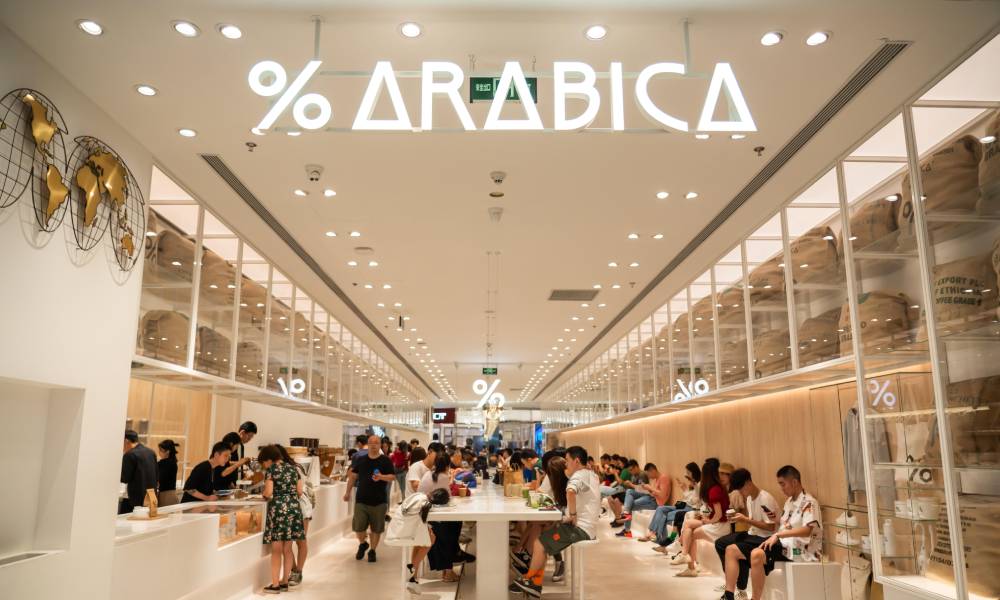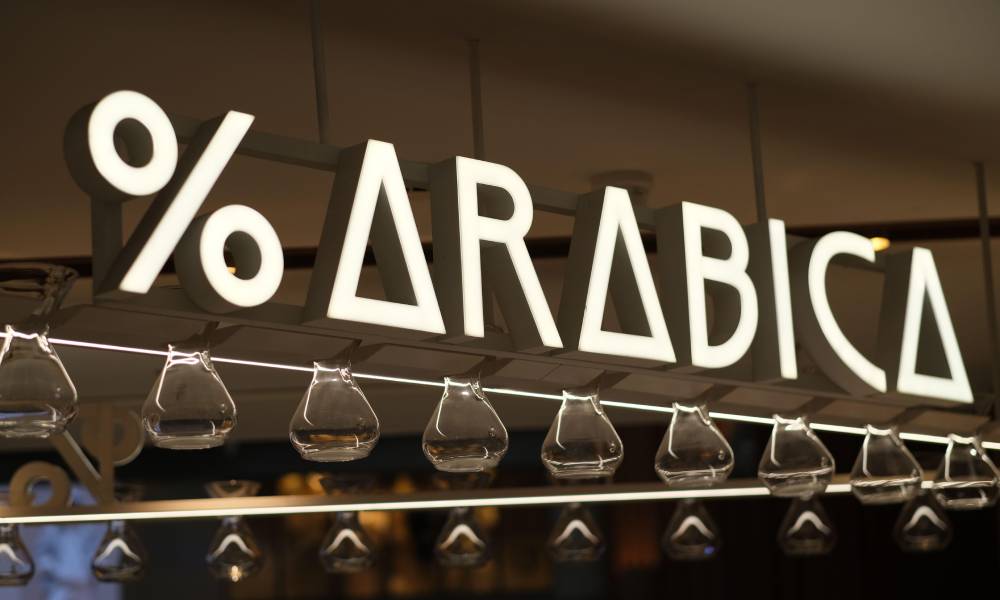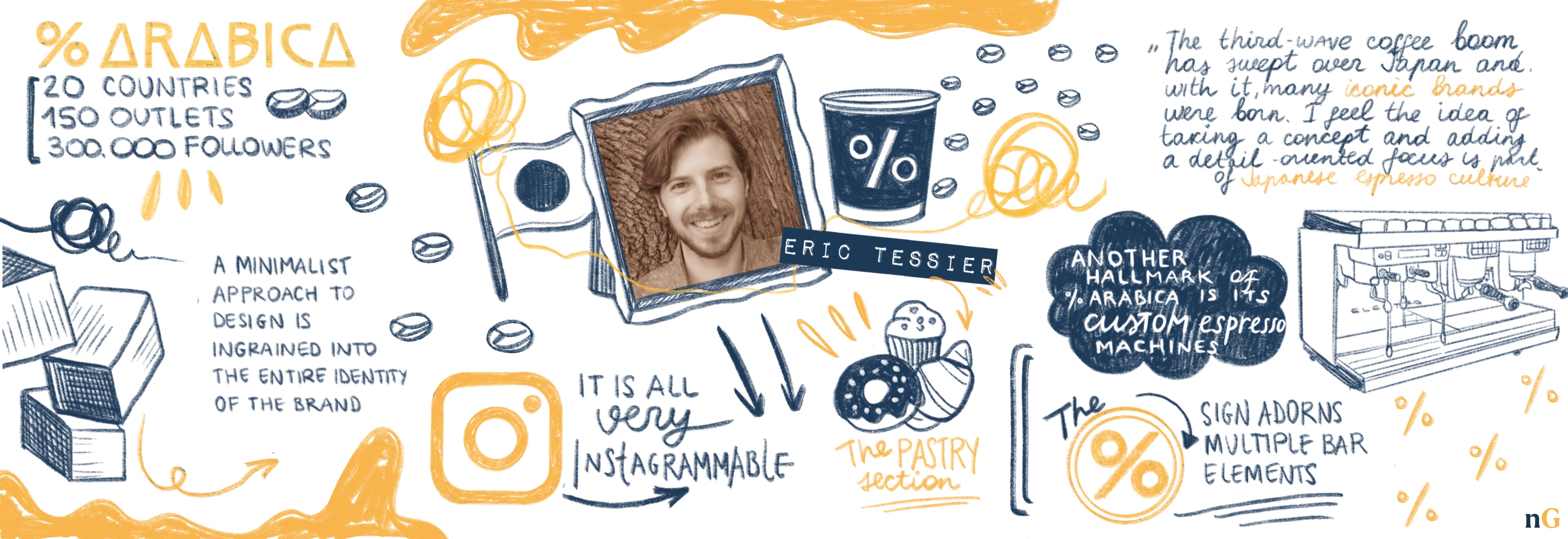How % Arabica redefined coffee shop design
Anay Mridul speaks with Tokyo-based coffee expert Eric Tessier about how % Arabica’s approach to coffee shop design has become a formula for global success.
When Kenneth Shoji left Japan following a devastating earthquake, he could only have dreamt that, in just over a decade, he would control a specialty coffee empire spanning the globe.
Yet today, Shoji’s coffee shop chain, % Arabica, has grown from one small store in Hong Kong to more than 150 outlets across 20 countries. From its headquarters in Kyoto, it has become an internationally recognised name owing to its minimalist coffee shop designs and striking espresso machines.
It has also built up a cult following, particularly among younger generations, with more than 300,000 followers across its Instagram profiles. In 2022, its impact on the UK since launching two years before, was recognised when it was awarded the Most Notable New Café award at the prestigious London Coffee Festival.
“I think it is amazing that someone with a vision and the right timing can spread a company so quickly,” says Eric Tessier, a coffee writer based in Tokyo. “I remember visiting Arabica when there were still only two locations, and the barista telling me that the owner envisioned expanding globally.
“At the time, I thought it was a far-fetched idea. Especially because many Western cities are saturated with coffee shops. Looking at the global map of % Arabica locations, I am rather humbled.”
Although some worried at the time that % Arabica’s rise signalled the end of Japan’s traditional coffee house culture, known as kissaten, most have now come to realise there is space for both.
“Traditional cafés, or kissaten, can be intimidating,” Eric explains. “% Arabica stood out at its founding as approachable and familiar to people from outside Kyoto.
“In the past decade, the third-wave coffee boom has swept over Japan and, with it, many iconic brands were born. I feel the idea of taking a concept and adding a detail-oriented focus is part of Japanese espresso culture.”

Coffee shop design: % Arabica’s not-so-secret weapon
When you walk into % Arabica’s flagship UK store in Covent Garden, London, you are immediately struck by how different it feels from other coffee shops. But then, after a few moments, you realise why.
A minimalist approach to their coffee shop design is ingrained into the entire identity of the brand.
The simple bar featuring an espresso machine built like an F1 car is set against a bare brick wall, with Chemexes hung and laid out deliberately upon light fixtures. There is a wall-mounted table with stools (both white) opposite the bar, with lighting that’s intentionally ambient and comforting.
The ‘%’ sign adorns multiple bar elements – including the paper cups, coasters, and sugar packets (all white, of course). Reflecting its attention to detail, there are also mini plastic simple syrup containers (akin to Domino’s dips) for iced drinks, with the same ‘%’ branding on top.
The pastry section houses giant croissants, canelés, vegan bliss balls, doughnuts, Danishes and cakes. The espresso machines are custom-made in Seattle for the brand, providing baristas with a tailored tool to make consistent drinks best suited to % Arabica’s coffee.
And apart from the classics, the espresso menu features a Kyoto Latte (which contains condensed milk), a Spanish Latte (more condensed milk), and a Dark Latte (which is essentially a mocha).
Notably, it is all very Instagrammable. As Eric puts it, “There’s a lot that can be learned from a well-planned café that works well for both patrons and employees. When a workplace and a public space feel organic together, it is a thing of beauty.”
He believes % Arabica caters to people looking for a comfortable third space: “The design is bright and open, and the designer clearly has thought about how the café will photograph. The aesthetic appeal paired with a familiar drink and a bit of cool factor go a long way.”

Drawing inspiration from % Arabica
% Arabica has become a true trailblazer in the specialty coffee industry thanks to its purposeful coffee shop design and branding. Each store is tailored to its location, as evidenced by the distinctive brickwork featured in their London locations. The brand’s success has made it a standout in the industry and act as a source of inspiration for coffee shop owners worldwide.
The minimalist aesthetic that % Arabica champions has gained considerable popularity in recent years. According to a survey, 59% of Americans prefer clean and minimalistic coffee shop design.
However, the appeal of minimalist design extends beyond its aesthetic benefits. In fact, it has practical advantages when correctly adopted. According to industry expert Eric, the less-is-more approach is ideal for coffee shops because it “reduces clutter and allows patrons to feel like they are part of the process”. As a result, customers feel more engaged in the coffee-making process, leading to a better overall experience.
Another hallmark of % Arabica is its custom espresso machines. These machines serve as the focal point in each store, providing consistency and quality with every cup of coffee served. By incorporating a attractive espresso machine, such as the Elektra KUP, into their coffee shop design, business owners can strike a balance between aesthetics and quality coffee service. Although a significant initial investment is required, Eric notes that it can pay off in the long run.
“Following in % Arabica’s footsteps would require a considerable amount of capital,” he explains. “But having a well-thought-out plan and a goal to aim towards will help guide coffee shops in the right direction.” By emulating % Arabica’s approach, coffee shop owners can create an unforgettable customer experience that sets their business apart from the competition.








